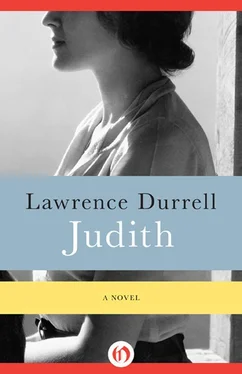Then, when they were dry, she led them once more across the maze of interweaving paths among the dim houses to where a gaunt building stood. As they entered it, the lights suddenly flashed on and a subdued cheer rose from the half-dozen or so late-comers who were finishing their dinners. The girls glanced curiously about them, half-blinded by the sudden illumination. Fifteen or twenty tough-looking men, mostly blonde, were eating their evening meal. They were clad in the traditional blue pants which Judith was to come to recognize as the uniform of these workers. They talked in low voices and smiled a greeting (“Shalom”) at the newcomers. It was a typical kibbutz canteen and several trolleys full of food circulated, pushed by girls and boys, some of whom were of another cast of feature with the long sallow faces of Sephardic Jews and their great dark eyes. The doctor took charge of the party, explaining everything in her cool detached voice: they fell upon their food ravenously and earned her smiling approval by their appetites.
Then the little party made its way outside. Judith stood still, inhaling the deep scents of the night and said to herself: “The stillness is the extraordinary thing.” The ordinary geography of the camp had now become much easier to comprehend, for with the restoration of the current the bulbs which lighted the curving intersecting pathways among the trees shone out clearly. A faint feeling of recognition came to the tired girls. The doctor led them to their quarters in a clean hut full of small single cubicles, each with a locker, a chair and a bed in it. She said good-night to the others and then, turning to Judith, said: “Would you care to come and see if Pete is back, or are you too tired?”
“No, I’ll come. I’m curious to know what she wants of me.”
“I don’t know, I’m sure.”
The two women made their way back towards the tall dark ramparts of the Crusader fort; now, with the light, its outline became clearer. It was obviously used as an administrative block, the houses and offices built cunningly into the ceinture of the ancient wall. She remarked on this, and the doctor said, “Yes, the old walls are still thick enough to stop a bullet.” It sounded a somewhat ominous remark. This time, they climbed the long wooden staircase and walked along the row of closed doors until they came to the end one. The doctor threw it open and they walked in. The light was on but the room was empty. Its only furniture was an old desk, a table, some files and a small old-fashioned safe. There was no ornament in the room save a small silver-framed photograph on the desk. Judith found herself gazing at it with amazement, hardly able to believe her eyes. She walked closer and stared. No, there could not be any mistake. She started out of her dream as the doctor spoke. “Well, she’s obviously not here and I don’t think she’d want to keep you hanging about, so let’s go.”
Without a word, Judith followed her along the landing and down once more into the courtyard, now feebly lit by a single electric bulb. She turned to the doctor and put an arm on her shoulder. “I can remember my way back to my billet,” she said with a smile. “You don’t need to show me. You must be sick of the sight of us all by now — and after all you’ve done too!” The doctor smiled and patted her elbow. “I admit to being tired, if you are sure you can find your way…
“Of course.”
“Then I’ll go back to my house; my husband will be there waiting for me, and probably a bit worried about the time.”
“By all means,” said Judith, “by all means.”
They said good-night and separated, and Judith was all at once glad to be alone. She walked, deep in thought, among the dark trees, slowing her pace to a saunter, while one half of her mind enjoyed the deep odours of the night, the smell of blossom. The sky was dark, but with a brilliant velvety darkness and the stars shone brightly. She turned off the track for a moment and sat down at the foot of a tree to savour it all for a few moments before she surrendered to sleep. She had been there for a few seconds only when she heard footsteps upon the pathway to her right and the sound of low voices. A man and a woman were approaching, in silhouette, with the feeble light behind them. Vaguely she recognized the outline of a man who looked something like Aaron; with him was a tall thin figure walking with a deliberate meditative slowness, dressed in some formless fashion which suggested a shawl, a mantilla or a cape. Yes, the man was Aaron. As they approached she heard him say in a sharp authoritative tone: “Pete, you listen to me and stop throwing your weight about. You may run the place as you please, but you are not running me.”
“I’m not trying to,” said the deep hoarse voice which Judith recognized as belonging to the woman called Peterson. “Not at all. But you are not to take any decisions inside the perimeter without consulting me or I shall have the committee on your neck. Is that clear?”
Aaron sighed with exasperation. “I am responsible,” he said angrily, “for the defence of this valley. My decisions are going to be respected and my orders carried out.”
“Not unless they meet with the approval of the committee.”
“Damn the committee.”
“I would be heartily glad to. But I can’t.”
Aaron stopped and took her roughly by the arm. “Listen, Pete,” he said angrily, “if we get this new stuff we shall have to improve the instruction for the settlement. This is automatic stuff, not bolt-action rifles and rusty muzzle-loaders. And everything will depend on it. I have made up my mind to find an extra hour a day for it. I know that everyone is dead-beat in the evening, but what else is to be done? We must turn them into efficient francs-tireurs as soon as possible. What’s more, I propose to start tomorrow if the stuff arrives.”
“I shall tell the committee. You will have my answer tomorrow.”
“Stop crossing me, Pete.”
“You stop crossing me, Aaron. I know how serious your military considerations are, but so are the crops. We must find a way round both difficulties. But you are not ordering me around, do you see? Not as long as I’m organizing secretary here.”
He bit his lip. They glared at each other like angry dogs. “Look,” he said at last, “if we get the stuff, I propose to start tomorrow night with a general demonstration… if the committee agrees.”
“That’s better,” she said grimly.
“And if it doesn’t, I shall know who to blame and who is responsible — and I shan’t forget it, Pete. On my word.”
“Good-night,” she said gruffly, and turned on her heel. Aaron stood in perplexity, looking after the diminishing figure. Then he shook his head and made off in another direction, banging his leg with a switch.
Judith was once more alone. She moved circumspectly across the path now towards the little hut from which a chorus of healthy snores resounded. The door of her room was ajar. She entered in darkness and undressed quietly before slipping into the hard but not uncomfortable bed. She turned on her side, put one arm under her head and was instantly asleep — a deeper, dreamless sleep this time which carried with it a hint of reassurance and even of a fugitive contentment. In her mind she heard the ripple of the Jordan river and felt its cold waters sliding across her breasts and flanks.
She awoke with a start, and found herself gazing into a pair of enormous black eyes, set deeply under arched brows in the long pointed features of an ancient Greek queen, or a witch. They were eyes with a deep sadness in them and yet at the same time with a hint of something like mischief. The face was oval, the forehead high, the lips thin and aristocratic. It was so close to her own that she had the sudden illusion that it was magnified to twice its normal size, as if seen through a lens. The figure was wearing not a mantilla but a dark shawl which was drawn up over her head in the fashion of a peasant-woman. The dark hair was liberally streaked with grey, though it was thick and curly. It was a head of striking beauty, with its long slender nose aimed justly to compensate for the hardness of the chiselled lips. The hands too, which had been softly touching the girl’s forehead in the darkness, were resolute and strong, and ringless. All this Judith took in with a single glance. It was clearly Miss Peterson, and she was kneeling beside the bed with a small candle alight in a saucer. They stared at each other for a long moment, neither pair of eyes so much as blinking. Miss Peterson’s, enormous and the colour almost of tar, were focussed on Judith with concentration and a certain air of greedy assessment. But, seeing herself observed now, she allowed a smile to overflow into them though her lips did not copy it. She put her finger to her lips and said, “Sorry I missed you.” Even her low whisper sounded hoarse and strong and peasant-like. Judith propped herself up and said:
Читать дальше












